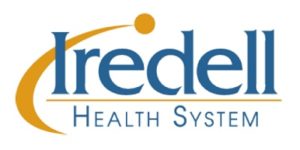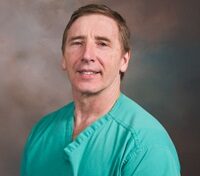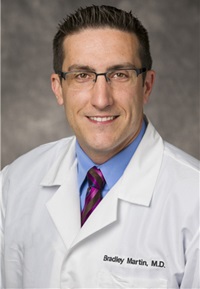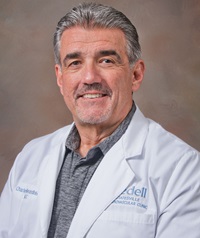
Special to Iredell Free News
Did you know that heart disease has been the leading cause of death in the country for 100 years?
A recent American Heart Association study reveals that more than half of Americans did not know that heart disease was the No. 1 killer in the United States — despite its century-long reign.
February is American Heart Month – an opportunity to highlight the importance of cardiovascular health and raise awareness about heart disease prevention.
To help educate the community about heart disease, three cardiologists, Dr. Bradley Martin, Dr. John J. Allan, and Dr. Charles DeBerardinis, shed some light on heart disease prevention, when to call 911, and local heart care.
Controlling the Controllables
Dr. Bradley Martin, Statesville Cardiovascular Clinic
You have the power to take action to protect yourself against heart disease. While some risk factors for heart disease cannot be controlled, like family history, other risks are controllable.
Small, heart-healthy lifestyle changes like eating a healthy diet or adding more movement to your day can have a big impact on protecting your heart.
1. Eat a heart-healthy diet.
“One of the most important things you can control is what you’re putting into your body. Diet is very important. A lot of patients ask me, ‘What is the perfect diet or the right diet to follow?’” said Martin.
Martin often recommends a Mediterranean-style diet that is low in saturated fats, high in protein, low in carbohydrates, and limits added sugars. The American Heart Association also recommends a Mediterranean-style diet as it:
• Emphasizes vegetables, fruits, whole grains, beans and legumes;
• Includes low-fat or fat-free dairy products, fish, poultry, non-tropical vegetable oils, and nuts; and
• Limits added sugars, sugary beverages, sodium, highly processed foods, refined carbohydrates, saturated fats, and fatty or processed meats.
“Sixty percent of our caloric intake per day should be from protein. I often try to have patients stick to a 1,800 to 2,000 calories-per-day diet. However, that does vary depending on your body size and physical activity,” said Martin.
2. Avoid putting toxins in your body.
“You should avoid putting toxins in your body. Nicotine and tobacco products are the number one offender. If you haven’t already, set a goal in 2024 to stop using tobacco products, as that will always be the number one thing you can do for your health to reduce your risk of having heart attack and stroke,” said Martin.
Martin also recommends limiting the consumption of highly caffeinated drinks as they may increase your likelihood of cardiac arrythmia.
“I try to avoid any of the energy drinks that have anything more than just caffeine, things like taurine or guarana,” said Martin.
If you must have caffeine, Martin suggests only drinking two low-level caffeinated beverages a day, like a cup of coffee or a diet soda.
3. Take care of your physical health.
“Exercise, as I’m sure you’re aware, is very important. Running, walking, swimming, biking, punching a heavy bag — whatever it is that gets your heart rate up and breathing heavy, 30 minutes, five days a week is going to lower your chances of having a cardiovascular event,” said Martin.
4. Manage your stress.
Mental health can positively or negatively impact your heart health. Stress can contribute to poor health behaviors like smoking or drinking, which are linked to increased risk for heart disease.
Chronic, long-term stress can lead to high blood pressure, which can increase your risk for heart attack and stroke.
“We all deal with stress. It’s hard on our system. Stress increases something called catecholamines in your bloodstream, which can increase your blood pressure. Learning some relaxation techniques and just taking five minutes a day to do deep breathing exercises can help regulate your stress levels,” said Martin.
Exercise and getting enough sleep can also help you manage your stress levels.
5. Work with your healthcare team.
“Make sure you’re following up with your primary care doctor or us here at Statesville Cardiovascular to help manage your risk factors such as high blood pressure, blood sugar, and high cholesterol levels. These factors can be tested easily through blood work or with simple testing measurements here in the office to ensure that we’re keeping your risk factors controlled,” said Martin.

When to call 9-1-1
Dr. John J. Allan, Iredell Cardiology
Heart attacks can be sudden and intense. But they can also develop and start out as mild pain or discomfort. Not everyone has typical heart attack symptoms. So it’s important to learn all the ways a heart attack might make you feel—and to call 911 right away if you suspect a heart attack. Fast action could save your life or someone else’s.
According to Allan, some of the common symptoms of heart attack include:
• Chest pain or discomfort;
• Back, neck, or jaw pain;
• Left arm or shoulder pain;
• Shortness of breath;
• Nausea or vomiting; and
• Sweatiness
“Deciding when to call 911 can sometimes be difficult for people. It’s not always clear to patients when you should do that. However, anytime you have a symptom that you’re not sure what it is, chest pain you’ve not experienced before, or any of the other warning signs of a heart attack, it’s best to err on the side of caution and call 911,” said Allan. “If you are having a heart attack, time is of the essence. We don’t want to have any damage or injury to the heart. Once that’s done, it’s irreversible, so the quicker you get in and get treatment, the better.”
Local Heart Care
Dr. Charles DeBerardinis, Statesville Cardiovascular Clinic
Iredell Health System offers the community a wide range of heart and vascular services and has been a Certified Chest Pain Center for 13 years. Iredell Memorial Hospital was recognized as high performing in the heart failure specialty by U.S. News & World Report as part of its 2023- 2024 Best Hospitals ranking.
Iredell Health System’s team of cardiologists, vascular surgeons, and expert nursing staff are committed to providing personalized care and treating the whole person, not just the condition because heart disease affects your whole life.
“Our board-certified cardiologists have a wide variety of special interests and expertise in all the subspecialties of cardiology, and we offer expansive cardiac care here. We also have several nurse practitioners and physician’s assistants who are well-versed in cardiology that help us in
the hospital and in our offices,” said DeBerardinis.
Cardiologists and vascular surgeons at Iredell Memorial Hospital’s Heart & Vascular Center can perform a variety of procedures including cardiac catheterization, pacemaker and defibrillator implantations, cardiac interventions, peripheral arterial interventions, and venous procedures. They also offer nuclear stress tests and EKG and echo stress testing.
“I’ve always thought being at a non-tertiary center offers us the opportunity to provide more personalized care, and I can assure everyone out there that we certainly take that privilege very seriously here,” said DeBerardinis.
LEARN MORE
♦ Dr. Martin and Dr. DeBerardinis both practice at Statesville Cardiovascular Clinic, located at 925 Thomas Street. In addition to Statesville, Martin also sees patients in Taylorsville and Mooresville. If you would like to schedule an appointment with Dr. Martin or Dr. DeBerardinis, call the office at 704-873-1189.
♦Dr. Allan practices at Iredell Cardiology. He sees patients in Statesville and Mooresville. If you would like to schedule an appointment with Dr. Allan, call the office at 704-878-4694.
About Iredell Health System
Iredell Health System includes Iredell Memorial Hospital; Iredell Mooresville; two urgent care centers; Iredell Home Health; Iredell Wound Care & Hyperbaric Center; Community and Corporate Wellness; Occupational Medicine; the Iredell Physician Network and more. Iredell Memorial Hospital is the largest and only nonprofit hospital in Iredell County. The comprehensive healthcare facility has 247 beds; more than 1,800 employees; and has 260 physicians representing various specialties. Centers of excellence include Women’s and Children’s; Cardiovascular; Cancer; Surgical Services and Wellness & Prevention. The Health System’s second campus, Iredell Mooresville, is home to the area’s only 24-hour urgent care facility, as well as an ambulatory surgery center, imaging center, rehabilitation services, and physician practices. The mission of Iredell Health System is to inspire wellbeing. For a comprehensive list of services and programs, visit www.iredellhealth.org.





